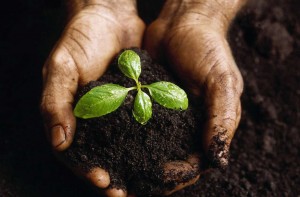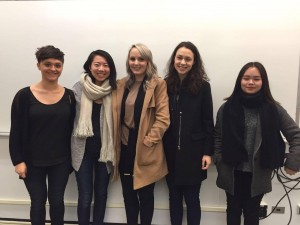Group 2: Little-Mountain Riley Park Food Hub
Theme: Seedlings
Growing more than vegetables

(http://foodmatterschilliwack.com/wp-content/uploads/2015/03/seedling.jpg)
Welcome to our first team blog post! We are a group of like-minded yet diverse students sharing a mutual interest in food, cooking, and community engagement. This project is only starting, but we feel each individual has brought a unique perspective to the team that creates a synergistic value.
Our Team
Jenny Qi: I am a 4th year Food Science student with a passion to bridge food and sustainability. I believe connection can be created through social sustainability by connecting people to their food and community. This project is a seeding ground for community engagement and I can’t wait to see how it grows.
Tamara Ritchie: I am in my final year of the Food and Nutrition double major. I love all science aspects of food and I think the growing conditions of the garden and the seasonal produce options will be exciting to work with. Having the knowledge of what you can grow throughout the year is a great skill to have. I am excited to gain experience in food production and processing based on produce produced by a community garden.
Alexa Tucker: I am a third year student majoring in Food, Nutrition, and Health. Over the past couple years I have discovered my love of creating educational materials for people to engage them in topics relating to food, nutrition, and sustainability, so I am really excited about the workshop component of this project. I believe that positive approaches to food education – like the food hub – are critical components for developing a healthier population.
Madelaine Anderson: I am in my third year of Applied Biology Food and Environment major. I am very interested in sustainable methods of producing food, especially at the community scale. Having a strong sense of community is important for the social aspects of sustainability and a community garden is a great way to educate and bring the community together.
Yimeng Zheng: I am a third year student major in nutritional science. I am very interested in learning about food, nutrition, and community food sustainability. I’m enthusiastic about getting involved in this project to gain knowledge of community organization to offer educational programs, foods, and to engage with the community stakeholders.
The Little-Mountain Riley Park Food Hub project has brought us together and we hope we can provide some needed “nutrients” for the project to flourish. As a group we chose this project because we felt we had a diverse enough background to cover the variety of aspects of a group garden. We have members that were interested in the gardening, others were interested in the food and cooking aspects, and sustainability as whole. Our goal as a team is to provide the community with a well rounded project that utilizes our knowledge in food science, nutrition and applied animal biology to nourish food sovereignty in the community. By using the Asset-based community model we realize that everyone has strength and interests and by allowing members to work on areas of the project that they excel at will strengthen the project overall (Mathie and Cunningham, 2003). Therefore, our varying interests will be an asset in helping the Little-Mountain Riley Park Food Hub reach their goals.

Alexa, Jenny, Tamara, Madelaine, Yimeng
Community Project
The goals of the project are to create a year-round growing plan that provides locally grown food for the community, and to prepare educational program documents that can be used by the food hub when educating community members.
Our Focus
In the 2015 winter term the previous LFS 350 group provided the Food Hub with operation procedures as they felt this is what could benefit the project most. Through meetings with Joanne (community partner) the idea of focusing on education and community engagement through the community garden sprouted, as both sides felt this is where our strengths could shine. The food hub already has strengths and personnel in the gardening aspect, and we as a team believe these strengths and knowledge should be respected. Our teams plans to survey community members from a varying demographics to gauge interest in the educational programs they would like to see. As this project was planted by the community, we would also like to see the community have a voice in how it grows and develops. This also ties in with the asset-based approach as we see the community members as the key stakeholders of the project, and not only the recipients of the food hub (Mathie and Cunningham, 2003). Their opinions need to be heard, listened and responded to, by the members that are making the decisions. It is through these community surveys and conversations we hope to build strong bridges between the decisions makers and the community.
Goals and Objectives
- To improve food sovereignty through community garden workshops
- To use food and gardening to bring together the community
- To provide workshops that allow a multicultural area to work and play together through food and cooking
- To provide workshops that allow all ages of the community to come together to enjoy and benefit from the community garden
Reflection
Although the project has just begun, the process has been exciting but challenging as it is easy to feel lost at times. At the beginning we were unsure of the focus of the project, this causes some anxiety within the group. In many other courses objectives are more clear and standardized while in this project the creativity and focus is left up to the students. This is both exciting and challenging as it is causing us to work out of our comfort zones. Once we met with the community partner the focus became more clear and our anxieties over the project started to subsided. The meeting sparked something within the team and we cannot wait to see how this project grows. Our next step is the project proposal and thus the anxiety will most likely return but we believe we have the skills as a team to provide the community with a great way to increase food sovereignty. We are looking forward to engaging with the community in the upcoming weeks and getting to the roots of what educational programs can sprout from this community garden.
References
- Mathie, A., & Cunningham, G. (2003). From clients to citizens: Asset-based Community Development as a strategy for community-driven development. Development in Practice, 13(5), 474–486.